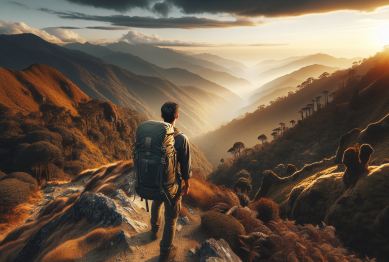Unlock the secret perks of solo travel with this in-depth guide. Discover how journeying alone can shift your perspective, boost your confidence, and lead to richer cultural experiences. Dive into safety, budgeting, and more—see what seasoned solo travelers wish they knew before setting out.
Why Go Solo? Surprising Benefits Await
Solo travel appeals to people of all backgrounds, but many hesitate due to concerns around safety, loneliness, and planning. Yet, people who take the leap often report not just new memories but a truly transformative experience. Traveling alone lets you set your schedule and follow your own interests, whether you’re exploring bustling city streets, hiking scenic trails, or relaxing by remote beaches. This freedom creates room for spontaneous adventures, personal discovery, and even unexpected friendships (Source: https://www.nationalgeographic.com/travel/article/tips-for-solo-travelers).
One surprising benefit of solo travel is the boost to self-confidence. Navigating foreign transit, choosing accommodation, or ordering a meal in another language builds a sense of capability that lingers long after the trip ends. It isn’t just about proving you can do it—the small wins, like finding a hidden café or catching the right train, remind you that you’re more resilient than you think. These confidence gains often spill over into everyday life, sparking greater independence back home.
Solo travel also cultivates mindfulness and presence. Unaccompanied, your senses are sharper—sights, smells, tastes, sounds all grow vivid. With fewer distractions, there’s more time for self-reflection and appreciation of surroundings. For some, traveling alone becomes a meditative retreat, while others find joy in striking up impromptu conversations, learning local customs, or even participating in group activities that never would have happened otherwise.
Building Confidence While Traveling Solo
For many, the first day of solo travel brings a wave of doubt. It’s common to feel vulnerable, especially in unfamiliar territory. But as the journey unfolds, every small accomplishment stacks up. Successfully navigating public transportation in a new city, negotiating at a local market, or simply dining alone can build enormous self-assurance. Consistently managing these everyday challenges allows solo travelers to see their true strength in action (Source: https://www.psychologytoday.com/us/blog/the-moment-youth/201804/how-solo-travelers-are-different).
One fascinating aspect is how solo travelers learn to trust their own judgment. There’s no group consensus, only personal intuition and quick thinking. This often leads to sharper decision-making skills, which are useful long after the passport is tucked away. Travelers also discover that with the right preparation—like understanding basic phrases or researching neighborhoods—the anxiety that often accompanies solo adventure gives way to confidence. These are valuable skills for anyone, especially those interested in personal growth and global exploration.
Beyond boosting confidence, solo journeys help overcome the fear of missing out. Without pressure to keep up with a group, individuals can craft their unique schedules and make spontaneous detours. This encourages creativity and problem solving, leading to rich and deeply personal stories. Over time, solo explorers find themselves embracing uncertainty rather than avoiding it. They often leave their journeys with a stronger sense of identity and a toolkit that extends into careers, relationships, and other life goals.
How to Stay Safe Without Losing the Fun
A common concern about solo travel is safety. Solo travelers often become skilled at blending in with locals and avoiding risky situations, simply by remaining vigilant and relying on credible travel advisories. Practical steps—like sharing itineraries with a friend, using reputable accommodation, and knowing local emergency numbers—can add peace of mind. Online platforms also help travelers share their experiences, boosting safety awareness for future adventurers (Source: https://travel.state.gov/content/travel/en/international-travel/before-you-go/travelers-checklist.html).
Technology is an invaluable tool for safety and support. GPS-enabled apps can guide lost wanderers back to familiar ground, while language translation apps bridge communication gaps. Before each new destination, reading government advisories and traveler reviews helps avoid scams or unsafe areas. Understanding customs and dress codes is another way to avoid unwanted attention. Simple things, such as blending in and maintaining situational awareness, go a long way towards safe and enjoyable travel. Prepared solo travelers quickly learn to depend on both instinct and information.
Yet, safety doesn’t mean sacrificing fun. Many opt for solo group tours or day excursions with local guides—the best of both worlds. These options allow independent exploration while offering built-in local knowledge and community. Hosting platforms and online forums connect like-minded individuals for meet-ups, dinners, or spontaneous city tours. This blend of freedom and connection helps solo travelers create an adventure precisely tailored to their comfort level and curiosity.
Budgeting for Your Solo Adventure
Budget management is a key concern for any traveler—especially solo explorers. Unlike group travel, individuals can’t always split costs on accommodations or private tours. However, solo adventurers gain the flexibility to choose budget-friendly lodging, decide on splurge-worthy experiences, and negotiate directly with vendors. Many take advantage of hostel dorms or shared apartments to reduce living expenses and meet fellow travelers (Source: https://www.nomadicmatt.com/travel-blogs/why-solo-travel-is-awesome/).
Flexible timing is another advantage solo travelers can leverage. Off-peak travel, last-minute deals, and public transportation keep costs low. Many travel apps highlight discounted tickets, activities, or meal specials. Learning to budget as a solo traveler also sharpens money-management skills that are useful beyond travel. Rather than limiting experience, these budgeting tricks open up new possibilities—spontaneous day trips, local food tastings, or even exclusive cultural events that arise out of a flexible itinerary.
Solo travel can also foster a greater awareness of spending habits and value. Without group pressure, it becomes easier to skip expensive tourist traps and invest in meaningful activities that align with personal interests. From free museum days to community markets, solo adventurers often find gems overlooked by mainstream guides. Tracking expenses ensures peace of mind, so the focus remains on the experience—not financial stress. Over time, many solo travelers develop a keen ability to make smart, satisfying choices with their travel budget.
Cultural Immersion and Making Meaningful Connections
An often-overlooked benefit of solo travel is how it encourages deeper local interaction. Without a companion to lean on, individuals are more likely to initiate conversations with locals, join cultural workshops, or accept spontaneous invitations. These connections lead to genuine stories and unique insights into the places visited. Whether it’s sharing a home-cooked meal or learning new traditions, solo exploration is often the ticket to authentic immersion (Source: https://www.lonelyplanet.com/articles/solo-travel-tips).
Solo travelers often find themselves invited to more events—family dinners, local festivals, or group walking tours—simply because they appear approachable. Many communities welcome curious visitors who are respectful and eager to learn. This participation isn’t just social; it can lead to greater understanding, language skills, and even long-lasting cross-border friendships. Such connections transform travel from sightseeing to meaningful engagement, creating memories that linger far beyond the journey.
From group cooking classes in Thailand to rooftop parties in Spain, the solo adventure can be unexpectedly social. Online communities and local meet-ups serve as springboards for connection, making it easy to find companions for day trips, hikes, or cultural events. These friendships are often rooted in shared curiosity rather than convenience, offering a powerful way to discover both the world and oneself. It’s no surprise many experienced travelers cite solo experiences as the most rewarding chapters in their travel stories.
Preparing for Your Own Solo Travel Journey
Preparation is the unseen backbone of solo travel. Smart planning—such as researching visa requirements, packing light, and securing digital copies of important documents—transforms potential risks into manageable to-dos. Many solo travelers recommend creating a flexible itinerary: mapped out enough for security yet open to spontaneous change. Essentials like a secure money belt, portable phone charger, and local SIM card offer additional reassurance and connectivity (Source: https://www.ricksteves.com/travel-tips/trip-planning/solo-travel).
Another part of preparation is setting realistic expectations. Not every day will be a montage of sunsets and new friends—there may be moments of boredom, fatigue, or frustration. Building flexibility and resilience into your mindset makes it easier to embrace these as a natural part of the journey. Over time, these moments can be the start of unexpected discoveries or opportunities for rest and reflection. Seasoned solo travelers often credit adaptability for their rich, unforgettable travel tales.
A little research goes a long way. Reading solo travel blogs, joining online groups, and following travel forums can provide location-specific guidance and up-to-date safety info. Connecting with communities before departure increases both excitement and confidence. Packing light and purposefully means less to worry about—freeing up precious energy for the adventure ahead. Ultimately, successful solo travel is less about a flawless plan and more about curiosity, resourcefulness, and an openness to new experiences.
References
1. National Geographic. (n.d.). Tips for solo travelers. Retrieved from https://www.nationalgeographic.com/travel/article/tips-for-solo-travelers
2. Psychology Today. (2018). How Solo Travelers Are Different. Retrieved from https://www.psychologytoday.com/us/blog/the-moment-youth/201804/how-solo-travelers-are-different
3. U.S. Department of State. (n.d.). Traveler’s Checklist. Retrieved from https://travel.state.gov/content/travel/en/international-travel/before-you-go/travelers-checklist.html
4. Nomadic Matt. (n.d.). Why Solo Travel Is Awesome. Retrieved from https://www.nomadicmatt.com/travel-blogs/why-solo-travel-is-awesome/
5. Lonely Planet. (n.d.). Solo travel tips. Retrieved from https://www.lonelyplanet.com/articles/solo-travel-tips
6. Rick Steves’ Europe. (n.d.). Solo Travel: Tips and Advice. Retrieved from https://www.ricksteves.com/travel-tips/trip-planning/solo-travel









